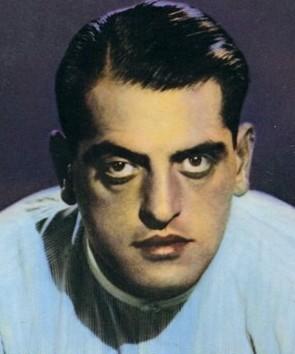Spanish director of international standing who worked in Spain, France and Mexico. Buñuel's first films, Un chien andalou (1929) and L'Âge d'or (1930), were made in Paris with Salvador Dali (though the latter's input on L'Âge d'or was minimal). Both masterpieces of Surrealist cinema, they established Buñuel as a key figure of the European avant-garde. They revealed his taste for shocking images (such as an eye being slit by a razor blade), as well as anti-clerical and anti-bourgeois provocations which would reverberate throughout his entire oeuvre. His first Spanish film, Las Hurdes / Land Without Bread (1932), however, was a grim documentary on poverty in rural Extremadura. In the last years of the Republic, Buñuel produced and partially directed a handful of films for one of Spain's more liberal production companies, Filmófono.
Following the Nationalists' victory in the Civil War (1939), Buñuel left for America but moved to Mexico in 1947 after failing to make headway in Hollywood. His Mexican films included popular melodramas such as Susana (1950) and El bruto / The Brute (1952) and more personal works like Los Olvidados / The Dispossessed / The Young and the Damned (1950), El / This Strange Passion (1952) and Nazarín (1958), which re-established his international reputation. Buñuel went back to Spain for Viridiana (1961, Palme d'or at Cannes), but the film was banned there as blasphemous. Though he would later return to Spain to film Tristana (1970) and parts of Cet obscur object du désir / That Obscure Object of Desire (1977), Buñuel spent the postwar years in Mexico and France where, in the 1960s and 1970s, he made a series of caustic, witty and elegant films in collaboration with scriptwriter Jean-Claude Carrière and producer Serge Silberman. Le Journal d'une femme de chambre / Diary of a Chambermaid (1963), Belle de jour (1966) and Le Charme discrèt de la bourgeoisie / The Discreet Charm of the Bourgeoisie (1972), starring the likes of Jeanne Moreau, Catherine Deneuve, Stéphane Audran and Fernando Rey, represent both the best of Buñuel's second French career and an important strand of the European art cinema of the time.
Despite Buñuel's geographically split career, strong continuities appear: all his films are marked by a fascination with Surrealism, especially in its exploration of the poetry of dreams, desire and amour fou, and imbued with a desire for release from childhood repression. The Surrealists, the Marquis de Sade—his "master"—along with major figures from Spanish culture (above all, the picaresque writers, Goya, Galdós and Valle-Inclán) were his key inspirations. At the same time, an early interest in Marxism prompted his repeated exposures of social injustice. Although in a sense sui generis, Buñuel's films are indebted to German Expressionism and Italian neo-realism as well as to popular Mexican and Spanish melodrama. His obsessions (religion, the bourgeoisie, marginalized individuals, sexual desire) are expressed in ways that explore the limits of experience without sacrificing tolerant understanding of human folly, though they are not always free from misogyny. Buñuel films, however, are graced with a distinctive brand of corrosive wit and sardonic humour.
— Peter W. Evans / Ginette Vincendeau,
Encylopedia of European Cinema
SELECTED FILMOGRAPHY
Un Chien Andalou / Andalusian Dog (France 1929)
L'Âge d'or (France 1930)
Los Olvidados / The Young and the Damned (Mexico 1950)
Viridiana (Spain 1961)
El ángel exterminador / The Exterminating Angel (Spain 1962)
Diary of a Chambermaid / Le Journal d'une femme de chambre (France 1963)
Simon del desierto / Simon of the Desert (Mexico 1965)
Belle de Jour (France 1967)
Tristana (France 1970)
Le Charme discrèt de la bourgeoisie / The Discreet Charm of the Bourgeoisie (France 1972)
Cet obscur objet du désir / That Obscure Object of Desire (France 1977)
LINKS
 L'Âge d'or: Basement Films Archive review
L'Âge d'or: Basement Films Archive review
 Un Chien Andalou: Basement Films Archive review
Un Chien Andalou: Basement Films Archive review
 El: Basement Films Archive review
El: Basement Films Archive review
 Exterminating Angel: review by Roger Ebert
Exterminating Angel: review by Roger Ebert
 Internet Movie Database
Internet Movie Database
 Luis Buñuel's Cinema of Entrapment
Luis Buñuel's Cinema of Entrapment
This page has been visited  times since 26 November 1999.
times since 26 November 1999.
